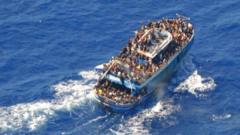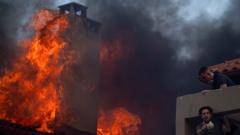A recent leak of audio recordings from a Greek rescue coordination center has sparked controversy, challenging the official narrative surrounding a shipwreck that resulted in the deaths of up to 650 migrants. Survivors allege that the Greek Coast Guard's actions contributed to the disaster, while the Coast Guard maintains it did not intervene as the migrants did not express a desire for rescue.
Leaked Audio Calls into Question Greece's Version of Tragic Migrant Shipwreck

Leaked Audio Calls into Question Greece's Version of Tragic Migrant Shipwreck
New recordings shed light on the events leading up to the maritime disaster, raising serious doubts about the Greek Coast Guard's account.
Leaked audio instructions from Greek rescue coordinators have brought uncertainty to Greece's official narrative regarding a catastrophic shipwreck that claimed the lives of potentially 650 migrants. The incident, which involved the vessel Adriana, occurred in international waters on June 14, 2023, after departing from Libya.
Survivors have accused the Greek Coast Guard of instigating the tragedy through a misguided towing attempt, claiming they were also pressured to remain silent. In contrast, the Coast Guard has asserted that no rescue was necessary since the migrants were not in immediate danger and were intending to reach Italy, not Greece.
The leaked recordings, first reported by News247.gr, showcase multiple calls made from the Joint Rescue Coordination Centre (JRCC) in Piraeus. During the first call, an officer instructs the captain of the migrant boat to communicate to an approaching ship that they did not wish to head to Greece. This raises questions about the motives and intentions of the Greek authorities as the vessel ultimately sank.
A second call features discussions about the migrants' desires, with the captain of a responding vessel confirming their insistence on heading to Italy. The audio communication recorded by the Greek authorities contradicts their earlier claims and suggests a deliberate attempt to manipulate information regarding the migrants' wishes.
The shipwreck is marked as one of the Mediterranean's deadliest incidents, with initial estimates placing the number of passengers at 750. Officially, 82 bodies were recovered, but it is feared that hundreds more may be lost at sea, including numerous women and children.
In response to the audio revelations, the Greek Coast Guard has claimed to submit all relevant materials to a Naval Court, currently investigating the tragedy. Despite their assertions of conducting humanitarian operations—rescuing over 250,000 migrants in the past decade—the integrity of the ongoing investigation has attracted criticism, with human rights organizations demanding a thorough international probe.
Concerns over the Coast Guard's actions during the incident led to previous legal challenges against nine Egyptian defendants alleged to have caused the shipwreck. The lack of jurisdiction by Greek courts ignited further controversies, with some arguing that survivors were coerced into accusing the Egyptians instead of the Coast Guard.
A human rights lawyer represented some of the defendants and indicated that the audio recordings align with the long-felt grievances regarding Greek authorities' treatment of migrants. This attorney contended that the Greek government’s narrative disrespected the victims and their families, demanding accountability and clarity in the investigation process. As the case continues to unfold, calls for transparency and a comprehensive inquiry into Greece's handling of migrant rescues remain strong, echoing the urgent need for reforms in refugee response policies in the region.





















